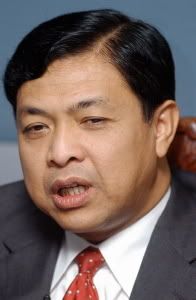Instant Meiji Noodles
Technorati tags: Politics, UMNO, General Assembly, Internet Media Blackout, Reform
… and other posturings of the UMNO Silly Season.
 Last Saturday, national news agency Bernama published an interview with UMNO Vice-President hopeful, Tan Sri Muhammad Muhd Taib, who is also Rural and Regional Minister. The interview was reported by Malaysiakini later on the same day.
Last Saturday, national news agency Bernama published an interview with UMNO Vice-President hopeful, Tan Sri Muhammad Muhd Taib, who is also Rural and Regional Minister. The interview was reported by Malaysiakini later on the same day.
Muhammad2 basically stated what many have already stated – that UMNO needs a transformation to remain relevant, and for the party’s survival. What was interesting is that he stated the kind of transformation required was a sort of Meiji Restoration.
“I am talking about a restoration ala the Meiji Restoration which brought about changes in Japan's political scenario about 150 years ago.
Japan at that time was under the Shogun and there was war. The Shogunate was toppled and the imperial rule restored and all the good values such as education and loyalty to king were brought back.
The restoration process towards the original struggle must be carried out.”
(source: Bernama)
Okay, so maybe “all the good values” weren’t altogether missing during the bakufu (shogunate) period, and the minister was over-simplifying. And apart from returning good values, quite frankly, Walski doesn’t really see the relevance of bringing up the Meiji Restoration.
But that’s not what Walski found most interesting.
The Meiji Restoration, while it did transform Japan into a military and economic power, did one other thing – it transitioned Japan away from a feudal state (source: Wikipedia), into modernity. And that’s the bit Walski finds interesting.
Interesting, because the UMNO Malay psyche, even today, is one deeply rooted in a feudal mindset. So, which bakufu is it that needs to be toppled?
(hyper-posturing against the winds of change, and more, in the full post)
Feudalism, in the Malaysian context today, is the adulation of those in political power, as exhibited by most in UMNO. The overt loyalty and respect shown to a particular leader lasts only as long as that person is in a position of power. And it pretty much sums up how UMNO members treat their leadership – adulation only as long as necessary.
Take Dr. Mahathir, for example. He was pretty much chastised by many of his so-called powerful UMNO supporters when he criticized Abdullah Ahmad Badawi. Dr. M became an almost persona non-grata. Just watch and see – Walski predicts that AAB will pretty much face the same spite once he’s no longer UMNO President and steps down from being the nation’s premier. The same people who were ready to show off their kerises in support will be the same ones who will say how ineffective a leader AAB was.
So, does Muhammad2 mean that feudalism within UMNO needs to be eradicated as well, in favor of real leadership capability and merit?
Or is it just posturing for the sake of the upcoming party silly season?
And speaking of Dr. Mahathir Mohamad, the now legendary speech (via Big Dog’s The “Thirteen Million Plus Ringgit Guy” Rambles) he made a couple of days ago on Sunday, March 22nd, is pretty much another exercise in posturing. Not on his own behalf, but for the sake of the political party he still loves. And, as some might argue, for the sake of his son, Mukhriz.
The speech was filled with a lot of melodrama, apples-vs-oranges analogizing, and most importantly, was very racially toned. After all, look at whom his audience was. More importantly, it was posturing with a very important message – change, or else.
Here’s Walski’s take on the speech, taken in toto, and not focusing on the trees alone, but the forest in totality:
- in the typical in-your-face fashion, Dr. M states that the Malays are their own worst enemy, because of their attitude and worldview
- if the Malays feel under threat, they only have themselves, not others, to blame
- corruption, in particular political corruption that is synonymous with the Malays, will be the Malays’ own undoing
- nothing will change the fate of a people, until and unless the people themselves change, and become the masters of their own destiny
- the NEP is a squandered opportunity, and one that has been abused
These are the real take-aways from the speech, from Walski’s perspective. The racist posturing is only to be expected, being that it was the “Perhmpunan dan Sidang Kemuncak Pribumi Perkasa Negara”. It was a speech fashioned to make the attendees (hopefully) understand. To Walski, the speech was not to fan the fires of racism, but to chide the staunch promoters of Malay race the futility of their efforts if they didn’t see the real problems for what they are.
The question is, however, what sort of take-away did the participants, and Malays in general, have?
There‘s no denying, however, that much of what we’ve become today happened in the 22 years that Dr. Mahathir was in power. The good, the bad, and the fugly. And that environment, too, is what gave rise to a third, and final, posturer that Walski would like to highlight today.
The Malaysian Insider, a couple of days ago, stated that Minister in the PM’s department (and de facto minister of religious affairs), Datuk Seri Dr Ahmad Zahid Hamidi, gave a final warning to the Bar Council – retract the A-word poll, or else (via The Malaysian Insider). This follows the penultimatum by the Selangor state religious department late last week (emphasis by myAsylum).
"If they (Bar Council) continue to play up the issue, the Muslims may rise and if they do, the Bar should not be angry but be willing to accept the consequences.
"This is the final warning for the Bar Council. Islamic religious matters come under the jurisdiction of the Malay rulers and if they continue to dispute the authority's decision on the issue (use of the word "Allah" in non-Islamic religious publications), it means they are disputing the power of the rulers," he told reporters after officiating at a ground-breaking ceremony for the Federal Territory Islamic Religious Council's Sekolah Menengah Imtiaz in Setiawangsa, here, today.
(source: The Malaysian Insider)
 Last Walski checked, Malaysia is still a democracy (and not an absolutist theocracy), and seeking opinions is not the same as disputing – except maybe in a theocratic dictatorship. He also finds this posturing funny. Why? Two reasons.
Last Walski checked, Malaysia is still a democracy (and not an absolutist theocracy), and seeking opinions is not the same as disputing – except maybe in a theocratic dictatorship. He also finds this posturing funny. Why? Two reasons.
The first, the minister is so gladly and proudly telling us that Malaysian Muslims are irrational and volatile. When Zahid Hamidi says “the Muslims may rise”, he obviously doesn’t mean it in the sense of how dough rises (a good thing), but in the Article 11-angry kind of way (not at all a good thing). One could even see this as a veiled threat of violence.
Secondly, if Zahid Hamidi is so passionately speaking on behalf Islam and Muslims, why is he so ambivalent about the very serious issue of corruption within UMNO. Oh, sorry… make that, money politics. Isn’t corruption money politics an evil that must be eradicated?
From The Star (big hat-tip to Aisehman):
What is your view on money politics in Umno?
Why is Umno the only party being blamed? I am sure other parties face this problem, too, but it is not highlighted in the media. It seems that the people are judging the Umno leadership.
To me this is not a crucial problem and I think other parties which govern states and who are in control of local governments also have the same problem. In Umno, the problem is exposed because Umno members themselves want to expose it.
(source: The Star)
As Aisehman rightly asks: What about money politics being wrong?
Could it be because Zahid Hamidi is not exactly Mr. Clean either? The Aisehman post also makes reference to a blog that “uncovers” a fair amount of dirt on this up and coming “it’s time for me to move up” politician. In the UMNO scheme of things, he’s vying for
This kind of posturing is almost like trying to disguise osteoporosis…
And so there you have it… the UMNO silly season and the posturing that comes with it… from nonsense, to sometimes-sense, to no-real-essence…
The UMNO General Assembly begins today, and with all the kinds of posturing we’ve been seeing, is this a sign that serious reform will be on the agenda?
From the looks of it, maybe… NOT.
















